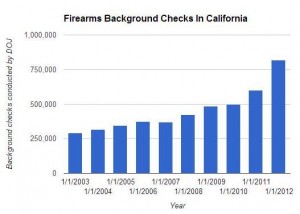Lindley attributes the most recent spike to concerns that state and federal gun controls will be tightened. “When you have a tragedy that happened in Connecticut, and people get fearful that the guns are going to be scarce, or there are going to be new federal laws, they run to the gun stores,” said Lindley, referring to the December 2012 Newtown school shootings that led to the recent push for more gun laws. “And gun sales go up dramatically.”
The Department of Justice has also provided five years’ worth of county-level background check data to KQED. Scroll down to view maps of how many firearms background checks were administered in each county between 2007 and 2011.

How California’s Checks Work
DROS, which stands for Dealer’s Record of Sale, is the bureaucratic name for the background check process initiated anytime someone attempts to buy a firearm in California. Gun sellers enter the potential purchaser’s personal information into a computer. Those details go to the Department of Justice, which runs it through criminal and mental health record databases.
“Obviously, if you’re a convicted felon you can’t have a firearm. If you have certain domestic violence or battery charges, you can’t have a firearm,” Lindley explained.
The list of conditions that bar a person from buying a gun in California goes on for eight pages. Most violent misdemeanors bar someone from buying guns. Restraining orders – even temporary ones – do, too.
There are also mental health barriers. People who have been admitted to a mental health facility because they were deemed a danger to themselves or others can’t buy guns for five years. If someone tells a therapist they’re planning on hurting someone else, and the therapist passes the information along to the police, that leads to a six-month ban.
Ben Van Houten is with the Law Center to Prevent Gun Violence, which pushes for stricter controls on firearms purchases. He said that long list of restrictions is one of two factors that makes California’s background check system one of the strongest in the nation. “If you look at a state like Arizona, where as long as you haven’t been convicted of a felony, or a very narrow category of domestic violence crimes, you can buy a gun,” he said.
The second factor is more significant: Federal law requires background checks only when people buy guns from licensed dealers. “If they’re buying from a private party, then they don’t have to undergo a background check at all,” said Van Houten. “It’s what we call the private sale loophole. From the best data that we have, roughly 40 percent of gun sales in America are private sales.”
California is one of a handful of states requiring background checks for every new purchase. If you want to buy a gun privately, you still have to find a licensed gun store and use its computer to send your information to the state.
County-Level Trends
The figures in KQED’s map represent all background checks, so they include the 1 to 2 percent of sales that were blocked when the state discovered information barring someone from being able to buy a gun. The amount of checks the state ran on “long gun” purchases – we’re talking rifles, shotguns – don’t directly correspond to the number of rifles purchased, since people are allowed to buy multiple long guns at once.
California’s increase coincides with a national spike in gun sales, which, going by the FBI’s background check totals, have increased every year since 2002.
The trend puts a strain on the Department of Justice team charged with running background checks on every purchase. Steve Lindley’s staff has expanded from 12 to about 20 as gun sales have grown, but the workload is outpacing their ability to hire more employees.
In 2011 – the last year that county-level data are available for – Southern California led the way in attempted gun purchases. The Department of Justice processed about 40,000 rifle background checks in Los Angeles County, and more than 43,000 for handguns. Both of those figures were substantial increases over the county’s 2007 totals. Orange and San Diego Counties were second and third for both handgun and rifle background checks.
In the Bay Area, more background checks are happening in Santa Clara County than anywhere else. The county saw a bit less than 16,000 handgun background checks in 2011 – a 104 percent increase from 2007 – as well as about 14,000 rifle checks.
Interestingly, San Francisco is bucking the state trend. Handgun background checks dropped by 75 percent in San Francisco County during the five-year window, from more than 1,000 in 2007 to just 280 in 2011. Checks on rifle purchases decreased by a bit less than 50 percent as well.


